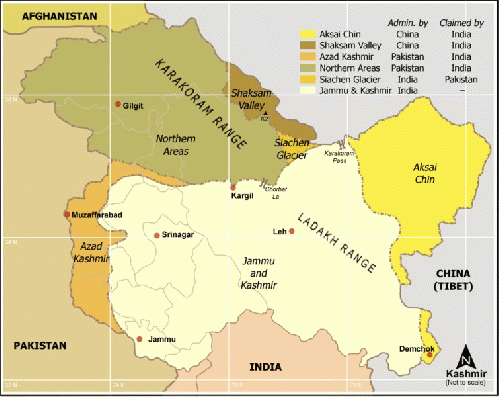"Oh, pilot of the storm who leaves no trace, like thoughts inside a dream.
Heed the path that led me to that place, yellow desert stream
My Shangri-La beneath the summer moon, I will return again
Sure as the dust that floats high and true, when movin' through Kashmir."
- Robert Plant, "Kashmir," 1975
In the early first millennium, it was a hotbed of Hinduism and later, Buddhism. Since the middle of the 14th century, Kashmir has been variously ruled by the Muslims, the Mughal Empire, the Afghan Durranis, the Sikhs, the Dogras and the British Empire. Today, India, Pakistan and China all lay claim to this beautiful region surrounded by deep gorges carved by the Indus River.
The clashes last fall between Indian troops and Muslim militants have resulted in over 40 deaths and have led to India's tightening military grip. There are now around 600,000 Indian troops deployed there.
On October 27, 2008, separatists called a general strike to mark the anniversary of the day when the Indian army took control in 1947. Businesses, schools, banks and government offices were closed in an attempt to stop a plan to create a human chain as part of a peaceful protest to Indian occupation.
Though this day has been marked by the separatists since the militant uprisings began in 1988, this is the first year that Indian officials took such harsh counterinsurgency measures. Their troops have killed five militants during a gun battle in the forests of Kishtiwar. Seventeen others were reported injured.
But violence is just the tip of Kashmir's iceberg, so to speak. Kolahoi, a twin-peaked glacier rising almost 18,000 feet (5,500m) into the sky, is rapidly melting due to global warming. The glacier's importance cannot be overestimated: Kolahoi is the region's only source of year-round fresh water, and is the origin of the valley's teeming apple orchards and rich fields of wheat, corn, rice and saffron.
Given the violence, Kolahoi has not been the most accessible place for scientists to visit. But local reports suggest that it has retreated up to half a mile (800 meters) since the mid-1980s. Geologists estimate that, at the current melt rate, the glacier will be totally gone in ten years.
In August, President Asif Ali Zardari of Pakistan and Prime Minister Manmohan Singh of India agreed to reopen trade in Kashmir in a commendable rapprochement that will hopefully bear fruit as more and more Kashmiris interact with some level of normalcy and get past 60 years of infighting. Last month was Ramadan, and Kashmir was relatively quiet as Muslims spent the holiest month of the Islamic calendar in prayer, reflection and fasting.
The recent skirmishes show that it will take more than political handshaking and spiritual contemplation to tamp down on the aggression. Perhaps the slow death of Kashmir's lush valley will finally give its various inhabitants a reason to put down their arms and find a common cause.
President Zardari and Prime Minister Singh should take this opportunity to form a "Kolahoi Accord" that creates a bilateral research and development committee with members from local governments, green businesses, trade unions and environmental organizations such as The Energy and Resources Institute (TERI) in Delhi and the International Union for Conservation of Nature (IUCN) in Pakistan to come up with a sustainable solution to save Kolahoi.
Parts of the plan could include trade incentives on goods that depend on a healthy glacier, the development of ecotourism and other market-driven initiatives to improve the livelihood of millions of Kashmiris.
And the Kashmiri youth are already one step ahead of the violence that has riddled Kashmir's past. Instead of guns, they carry cameras to record instances of abuse, which are then posted on the internet. Perhaps if India allows peaceful protest and reduces the military tension a bit, the young photographers could be enlisted to train their lenses on recording the effects of the receding glacier instead of on public beatings by the police.
Whatever a Kolahoi Accord may or may not accomplish, if it means giving the violence a temporary rest to ponder the future of a glacier that everybody needs, it's certainly worth the effort.
(Note: You can view every article as one long page if you sign up as an Advocate Member, or higher).





